|

"May you be in heaven half an hour before The Devil knows you're dead . . ."
"Fortunately," Barrymore replied, with vast disdain, "I don't think of it."
This was true of millions of otherwise true-blue Americans.
It was true of Americans who said grace before meals and went to church every Sunday and sometimes twice a week.
It was true of Americans who could take the hard stuff or leave it before the nation went Dry by fiat. Whiskey acquired a brand new taste in the Twenties. It was forbidden fruit.
Deets Pickett, secretary of the Methodist Episcopal Church's Board of Temperance, Prohibition, and Public Morals said the Dry law had done more for our health than anything since medical science put the finger on bacteria. Pickett called the Lawless Decade the "astounding
Twenties" and saw it as a time of "unprecedented confidence, of record-breaking business achievement," even of achievement in the world of athletics which had been hitherto unknown. "We learned to drink milk
The Wets went to the other extreme, naturally. They gave Prohibition credit for nothing more than the biggest sick headache in history. Wherever the Drys threw out a figure involving the purse, such as the nation's higher purchasing power or the boom in savings and salaries, the Wets reminded people about our vast economic prosperity. It was something like a murder case based on an insanity plea: each side had a set of separate facts and a set of separate experts to support them. In the case of Prohibition, there was so much passion on both sides that the truth couldn't possibly be known, then or now.
Was there any way to seal off our borders?
Was there any way to flush the moonshiners out of all the hills or go into all the basements and kitchens where Americans were cooking their own alcohol during the Twenties?
The record won't show. Congress never put out enough money to do anything more than make an occasional lame swipe at the illicit liquor trade and grab off some headlines. And in the White House three successive Administrations gave nothing but lip service (wet lips, in Harding's case) to the Dry cause.
But consider the situation realistically.
Our Canadian border is 3,986 miles long. An army would have a hard time policing it. Liquor flowed into the United
States by land and sea from the giant spigot so freely that the supply always exceeded the demand although, alas, the customer didn't always taste our good neighbor's good brew. Many bootleggers elected to peddle inferior
Our vast Atlantic seaboard similarly defied policing so the Rum Row flotilla plied almost at will between New York and such points as Nassau ("The Isle of Rum") and St. Pierre of the Miquelons ("The Isle of Champagne") and
Now consider the moonshiners, flourishing in the most unlikely places. An abandoned church in Iowa had a $50,000 rig in its sub-cellar. A Virginia farmer sliced his dugout right into the green hills. An Omaha still trailed out of a barn through a sixty-five-foot concrete tunnel. A Colorado moonshiner set up in a
Even if it wanted to--and there was never more than a handful of "revenooers" beating the bushes--how could the government put a dent in this thriving, resourceful and highly profitable industry? The pastoral bootlegger hummed along nicely
Beyond the Canadian supply, beyond the freebooters on the Atlantic and beyond the moonshiners lay the legion of alky cookers in the cities. It would have taken nothing short of a federal census--preferably in simultaneous night raids--to get a count on the industry's output. The tenements simply ran with alcohol. How could you stop that flow?
And, again, did anybody want to? The courts dealt out nothing but small fines to the offenders who got caught. For that matter, jail sentences for Prohibition violators would have filled the prisons to overflowing, just as today there wouldn't be room enough behind bars to hold all the traffic and narcotics violators if the police and the courts got tough with them.
|


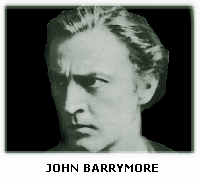 Worn out by his strenuous labors on the Broadway boards in Clair de Lune, John Barrymore (not to be confused with the man in the title of this chapter) betook himself to Europe for his version of some rest. Somebody over there asked the Great Profile what he thought of Prohibition.
Worn out by his strenuous labors on the Broadway boards in Clair de Lune, John Barrymore (not to be confused with the man in the title of this chapter) betook himself to Europe for his version of some rest. Somebody over there asked the Great Profile what he thought of Prohibition.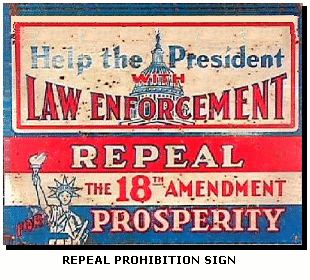 It was true of Americans who had never broken any other law and wouldn't even dream of exceeding the fifteen-mile speed limit on the city streets.
It was true of Americans who had never broken any other law and wouldn't even dream of exceeding the fifteen-mile speed limit on the city streets.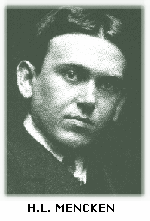 Nobody who wanted to savor that fruit paid any attention to the law. "The business of evading it and making a mock of it," H.L. Mencken observed, "has ceased to wear any aspects of crime, and has become a sort of national sport." Polly Adler, the celebrated New York madam whose occupation took her into intimate contact with all manner of life during the bad old days, had an equally cynical view of Prohibition. "They might as well have been trying to dry up the Atlantic with a post-office blotter," she said. Her point was that as long as people wanted to drink and pay the price there would be limitless amounts to go around. Polly Adler found it that way in her own field as well.
Nobody who wanted to savor that fruit paid any attention to the law. "The business of evading it and making a mock of it," H.L. Mencken observed, "has ceased to wear any aspects of crime, and has become a sort of national sport." Polly Adler, the celebrated New York madam whose occupation took her into intimate contact with all manner of life during the bad old days, had an equally cynical view of Prohibition. "They might as well have been trying to dry up the Atlantic with a post-office blotter," she said. Her point was that as long as people wanted to drink and pay the price there would be limitless amounts to go around. Polly Adler found it that way in her own field as well. 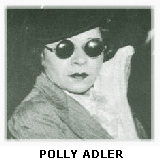 As it happened, nothing in the Eighteenth Amendment took dead aim on the thirsty citizen. The government, in its half-hearted way, sought out the man who made whiskey or ran it through our wafer-thin land and sea blockades or sold it over the bar. Uncle Sam wanted the purveyor of bottled fun, not the fellow foolhardy enough to quaff the hard stuff when so much rotgut was in circulation.
�����������
As it happened, nothing in the Eighteenth Amendment took dead aim on the thirsty citizen. The government, in its half-hearted way, sought out the man who made whiskey or ran it through our wafer-thin land and sea blockades or sold it over the bar. Uncle Sam wanted the purveyor of bottled fun, not the fellow foolhardy enough to quaff the hard stuff when so much rotgut was in circulation.
�����������
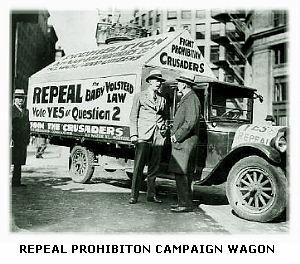 The Drys went through their thirteen-year moment in the sun bravely piling up statistics to show that Prohibition was a huge success. Professor Irving Fisher of Yale, the blue-noses' intellectual battering ram, said the Volstead Act cut deaths, poverty, disease, divorce and industrial accidents and made cash registers jingle like slighbells in groceries, candy shops, shoe stores, restaurants, hardware stores, jewelry shops and clothing stores.
The Drys went through their thirteen-year moment in the sun bravely piling up statistics to show that Prohibition was a huge success. Professor Irving Fisher of Yale, the blue-noses' intellectual battering ram, said the Volstead Act cut deaths, poverty, disease, divorce and industrial accidents and made cash registers jingle like slighbells in groceries, candy shops, shoe stores, restaurants, hardware stores, jewelry shops and clothing stores.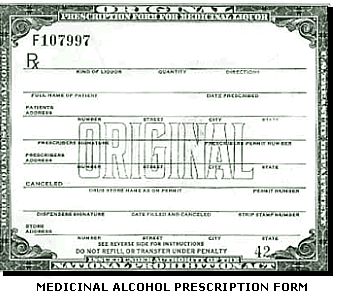 as never before," he said, "and our tables were loaded with fresh vegetables and
fruits . . . and the young people became taller and healthier and more vigorous." Pickett also noted that more men bought life insurance, presumably because they got more serious once the laughing water ran out. He credited Prohibition with the fact that bank deposits had soared from fifteen billion dollars in 1920 to just under twenty-nine billion in 1929, while deposits in savings and loan associations went up from two to seven billion dollars.
as never before," he said, "and our tables were loaded with fresh vegetables and
fruits . . . and the young people became taller and healthier and more vigorous." Pickett also noted that more men bought life insurance, presumably because they got more serious once the laughing water ran out. He credited Prohibition with the fact that bank deposits had soared from fifteen billion dollars in 1920 to just under twenty-nine billion in 1929, while deposits in savings and loan associations went up from two to seven billion dollars. Roy A. Haynes, an early Prohibition Commissioner, said the law cut drunk arrests in half (for women, 80 percent), cut deaths from alcohol, cut the population of prisons and almshouses and cut juvenile delinquency and offenses against chastity. Dr. Louis Henry Smith, president of Washington & Lee University, called the law "the longest and most effective step forward in the uplift of the human race ever taken by any civilized nation. "And all the Drys said all the happy workers were doing a better job, now that their eyes were clear, and thus were making more money.
Roy A. Haynes, an early Prohibition Commissioner, said the law cut drunk arrests in half (for women, 80 percent), cut deaths from alcohol, cut the population of prisons and almshouses and cut juvenile delinquency and offenses against chastity. Dr. Louis Henry Smith, president of Washington & Lee University, called the law "the longest and most effective step forward in the uplift of the human race ever taken by any civilized nation. "And all the Drys said all the happy workers were doing a better job, now that their eyes were clear, and thus were making more money.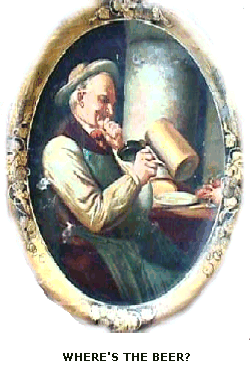 Other authorities, digging even deeper, cited "surveys" to show that profanity had decreased by 80 percent and prostitution by 97 percent, while some said that even the slums had disappeared from the big cities.
Other authorities, digging even deeper, cited "surveys" to show that profanity had decreased by 80 percent and prostitution by 97 percent, while some said that even the slums had disappeared from the big cities.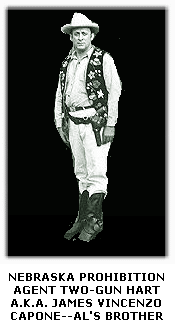 Was there any way to enforce Prohibition?
Was there any way to enforce Prohibition?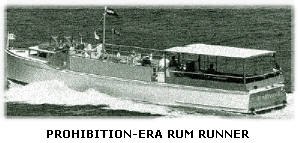 homemade brands under Canadian labels and make a killing on the price. They bought only what they had to buy in the overland trade, or from the boats plying the Lake Erie ports, or from the sleds that ran the stuff when the waterways froze over.
homemade brands under Canadian labels and make a killing on the price. They bought only what they had to buy in the overland trade, or from the boats plying the Lake Erie ports, or from the sleds that ran the stuff when the waterways froze over.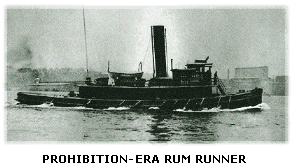 the other ports of supply. The Prohibition people, of course, publicly proclaimed the doom of the rumrunners every time a pinch was made at sea, just as they always talked of the Canadian traffic as a mere trickle that would be under control any day--or sooner.
the other ports of supply. The Prohibition people, of course, publicly proclaimed the doom of the rumrunners every time a pinch was made at sea, just as they always talked of the Canadian traffic as a mere trickle that would be under control any day--or sooner. 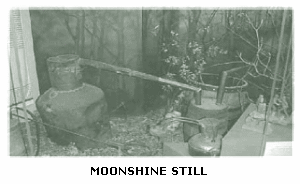 cave under heavy brush and buried dead animals nearby so the stench would counteract the mash and whiskey fumes. A Mississippi man with the same idea had a huge manure pile over his underground still.
cave under heavy brush and buried dead animals nearby so the stench would counteract the mash and whiskey fumes. A Mississippi man with the same idea had a huge manure pile over his underground still.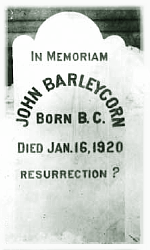 before, during, and after Prohibition. He is doing business today at the same stand, although understandably on a much smaller scale.
before, during, and after Prohibition. He is doing business today at the same stand, although understandably on a much smaller scale.